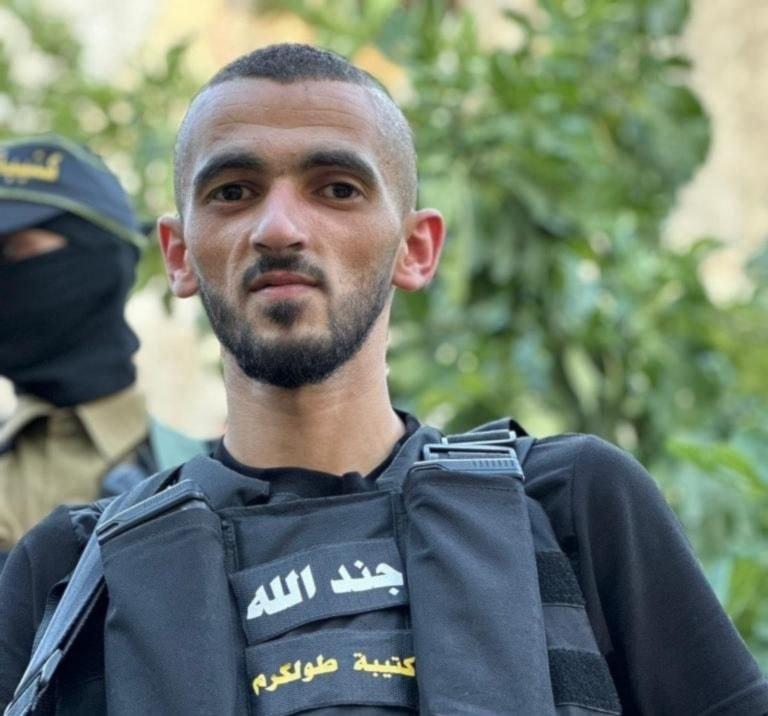
Al Mayadeen conducted an interview with the commander of the Tulkarm Brigade within the al-Quds Brigades, Mohammad Jaber “Abu Shujaa”, which translates to “the father of courage”, the occupation’s most wanted individual in the occupied West Bank.
Abu Shujaa insisted his first media interview be with Al Mayadeen, despite the Zionist regime and its apparatus’ pursuit of him.
Gaza: The people of fortitude and resolution
Abu Shujaa kickstarted his interview with a discussion on the integration of the Resistance in the West Bank in the Battle of Al Aqsa Flood, alongside the heroes of Gaza.
“We learn patience and resistance from the sons and fighters of Gaza and draw high morale from them. The Resistance remains as brilliant and valiant across all battlefields against the occupation 10 months into the war, despite the ‘Israeli’ criminality that continues to target civilians, women, and children,” he said, giving the example of the Israeli massacre against Palestinian civilians in Al-Tabeein School.
He addressed the people of Gaza, extending solidarity and relaying the inspiration and lessons they [Palestinians/fighters in the West Bank] have learned from them, praising their heroism, and asking for a Godly reward to be bestowed upon them.
“You are the people of fortitude and resolution, who have proven to the whole world that Gaza’s people can eradicate ‘Israel'”, Abu Shujaa said, calling the Resistance factions’ leadership to be the victors of Al-Aqsa Mosque.
He further hoped the Islamic Ummah would not show indolence, particularly as the Resistance fighters were confronting the usurpers of rights and land, citing Yitzhak Rabin’s notorious “A dead Palestinian is a good Palestinian,” explaining that all Palestinians are targeted in Zionist ideology.
On the Zionist assassination plots
Abu Shujaa has been pursued by the occupation, with its forces failing to assassinate him three or four times, after being targeted in an operation specifically designated for him.
After the operation failed, the Zionist occupation continued its invasion of Tulkarm for 55 hours, according to the commander, who stressed that the regime was more fragile than a spider’s web, particularly after all the losses it had suffered.
The occupation has always been weak, but refuses to admit it, Abu Shujaa said.
“If the enemy assassinates me, we will continue. The struggle does not end with one person, there are generations that rise to defend our rights, and the biggest indicator is the martyrdom of a Palestinian and more in each home in Tulkarm, and the Resistance continues.”
The masses have not risen for Abu Shujaa, he said, but for the idea of Resistance that solidifies their commitment [to armed struggle].
He addressed Israeli occupation, saying “The field decides all, and here it is… Eyes on the field.”
After the assassination attempt failed, the occupation spread rumors after withdrawing from Tulkarm that it had assassinated Abu Shujaa. However, hours later, the occupation and his loved ones were surprised that he was alive and well.
Abu Shujaa clarified that he and a few people remained in the (Al-Kanir) neighborhood during the Zionist invasion, and the rest were martyred, adding that the occupation indiscriminately shelled them using RPG shells, and were confronted [by the Resistance] with rifles and explosive devices.
After that, the occupation admitted that two soldiers were killed and nine of them were seriously injured. “Of course, this is on its own account, knowing that the losses were greater,” Abu Shujaa said.
A salute to the support fronts
Abu Shujaa sent his greetings and respect to the Axis of Resistance, from Sanaa to Tehran, all the way to southern Lebanon and its proud suburb [Dahiya].
Addressing Sayyed Hassan Nasrallah, Abu Shujaa said “We, in the Islamic Jihad Movement, and especially the West Bank Brigades, love you and send you peace. We are brothers, and we stand with each other, and we are all one hand in confronting the occupation.”
‘Fight the enemy wherever he may be’
In his message to the Palestinian people, especially the youth of the West Bank, Abu Shujaa said, “Do not be deceived by temptations, for life is either a life of honor or a life of humiliation. Whoever wants to live a life of humiliation will walk through life with his head bowed down. Therefore, we must choose a life of honor, pride, and liberation.”
He urged them to fight the enemy wherever it may be, to not abandon the cause, regardless of the pressure they might feel.
He also paid tribute to the martyrs and their families, pledging to preserve and sustain their legacies. “As the leader Dr. Ziad Nakhaleh, may God protect and preserve him, said, “The Palestinian people, even after a hundred years, will continue to fight until the land is liberated.”
Abu Shujaa saluted Al Mayadeen, its chairman, and its employees, for its dedication to the Palestinian cause, since its establishment despite all the Zionist pressures, threats, and restrictions.
A biography full of struggle
Mohammad Samer Jaber, nicknamed “Abu Shujaa”, is 26 years old, born in 1998. He comes from a Palestinian family that was displaced by the occupation from the city of Haifa during the 1948 Nakba and settled in the Nur Shams camp.
He grew up in the camp and studied in its schools. His brother, Martyr Mahmoud Jaber, was killed in the camp nine months ago. He also has two brothers, Ahmed and Ouday.
Ouday was freed from Zionist detention five years ago, while Ahmad remains a prisoner.
Abu Shujaa spent five years in Zionist prisons, after being arrested when he was 17, then twice after, alongside the Resistance’s leadership.
His name became known as one of the most prominent founders of the Tulkarm Brigade – al-Quds Brigades, after the martyrdom of the resistance fighter Saif Abu Labdeh from the Nur Shams Camp, who bred the idea of the battalion and its ignition, similar to what the West Bank has seen over the past years.
Abu Shujaa took over the battalion’s leadership and development, praising the role of the great leader Izz al-Din in supporting it.